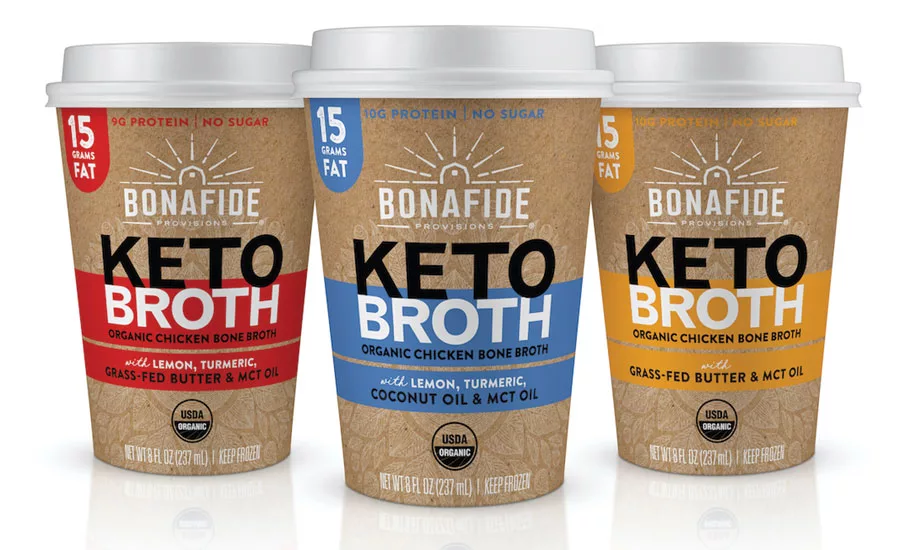Global keto market projected to reach $5.4B by 2023
Beverage segment accounts for roughly quarter of 2018 market

As they ring in the new year, some consumers might be looking to incorporate a new set of diet trends as part of their New Year’s resolutions. One diet trend that has gained traction with consumers lately has been ketogenic diets, a plan in which consumers reduce carbohydrate intake along with increasing fat content in their diet.
“A keto diet is low on carbohydrates and moderate on protein, which helps to lose body weight, and thereby improves health,” says Ritesh Kumar, senior industry analyst for United Kingdom-based Technavio. “In a keto diet, the percentage of fat, protein, and carbohydrates can vary between 70-75 percent, 18-20 percent [and] 5-12 percent, respectively.”
Adding that people should only go on the diet after consulting with a physician or nutritionist, Kumar explains how the diet plan impacts one’s body.
“A keto diet helps to break down body fat into ketones that provide energy to the different organs of the body, including the brain, heart and kidneys,” he says.
Citing 2016 World Health Organization data, Kumar notes that 33-35 percent of the global overweight population could be defined as obese and that number is expected to further rise in the coming years. Additionally, in 2018, 5-7 percent of the global population lives with diabetes.
“The keto diet is suitable for people who are obese or have been diagnosed with diabetes; it cuts drastically on the consumption of food products that have starch/sugar,” he says. “The growing prevalence of obesity and diabetes worldwide is likely to lead to a large number of people opting for the keto diet in the coming years.”
As ketogenic diet trends gain momentum, market research firms expect this market to continue to grow. The global ketogenic diet market was valued at $4 billion in 2018 and is predicted to grow at a compound annual growth rate (CAGR) of 4.6 percent by 2023, according to Technavio data. The market research firm forecasts the market to reach $5.4 billion globally by 2023.
“It is a fragmented market with both regional and global players competing to establish their presence and market dominance,” Kumar says. “However, the growth prospects of the market may be affected by other popular dietary plans such as the Atkins diet and the paleo diet that can provide benefits similar to the keto diet and are also less restrictive. For instance, a paleo diet allows the consumption of fruits, whereas the Atkins diet does not restrict protein intake and even introduces carbohydrates at some stage of the diet. On the other hand, a keto diet limits carbohydrate and protein intake.”
When it comes to keto-friendly products, beverages accounted for 26-28 percent of the global keto diet market in 2018, Kumar explains.
“The segment is expected to grow significantly compared with the other segments, namely, keto supplements, keto snacks, and keto meal replacement products,” he says.
Beverage-makers are realizing the potential of this market as it serves a growing consumer population. For example, Bonafide Provisions, Carlsbad, Calif., launched Keto Broth, a line of heat-and-go drinkable bone broths. Packaged in 8-ounce cups, the new line combines key nutrients that support and promote ketosis: organic bone broth, which helps the body digest fat; and MCT oil, a specific type of fatty acid that helps the body produce ketones, the company says.
Keto Broth is certified organic, contains no additives, preservatives, stabilizers, fillers, powders or sweeteners, it adds. Keto Broth is available in three flavors: Keto Broth with Lemon, Turmeric, Grass-fed Butter and MCT oil; Keto Broth with Lemon, Turmeric, Coconut Oil and MCT oil; and Keto Broth with Grass-fed Butter and MCT oil. Each 8-ounce cup offers 15 grams of healthy fats and 9-10 grams of protein.
Los Angeles-based Koia Inc. also is helping fulfill the growing demand for keto with its Koia Keto line. The dessert-inspired line, which is available in Chocolate Brownie, Cake Batter and Caramel Crème, offers a convenient indulgence to complement ketogenic diets, the company says. Koia Keto is made with nutrient-dense ingredients such as coconut milk and MCT oil to provide sustained energy and deliver the desired ketosis ratio of 74 percent fat, 18 percent protein and 8 percent net carbohydrates that help accelerate the process, it adds. Each flavor contains 12 grams of protein with no added sugar.
Foodservice operators also are developing solutions that support keto diet trends. This past summer, Dallas-based Smoothie King launched Keto Champ smoothies. Keto Champ smoothies featured an amalgamation of high-fat, high-protein ingredients like almond butter, collagen MCT blend, cocoa and almond milk, and contain no artificial colors, flavors or preservatives. Keto Champ smoothies are available in Berry and Coffee varieties and contain less than 10-net carbohydrates in each 20-ounce serving.
As keto diet trends look to be on the rise, new product development for these products could be among the trends to watch for in the beverage market in 2020. BI
Looking for a reprint of this article?
From high-res PDFs to custom plaques, order your copy today!






